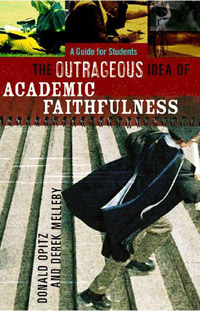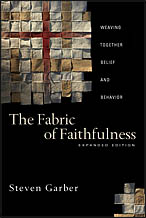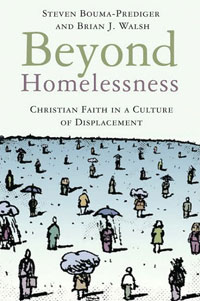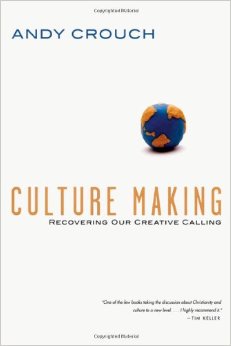Fighting off illness after packing up the van, Beth and I took our books Westward to Geneva College, where good friends there had invited me to address their faculty. (And, man, was I nervous!) As an obviously Reformed institution, they are all about the sovereign reign of Christ over all of life. Francis Schaeffer gave his wonderful lecture that became Art and the Bible there. (I had friends who hitchhiked there from our college in the early 70s and I foolishly did not go. What did I know?) Now, decades later, Geneva is a small but important voice in the movement to promote the worldview that calls for an integration of faith and learning, the stuff inspired by Schaeffer, not to mention Abraham Kuyper’s famous line about Christ pointing to “every square inch” of creation and declaring “Mine!” Like most intentionally-Christian colleges, professors are expected to “think Christianly” about their fields, to teach in a distinctive fashion, to invite students into the deepest conversations about what matters as they prepare for vocations in the arts and sciences, and are tasked to mentor young adults with not only the Christian mind, but a counter-culturally powerful alternative Christian way of life, “in but not of” the world, as the Gospel of John puts it. My lecture to them, my sermon, was a heartfelt cry of appreciation for their strategic work in raising up a generation of young scholars who will be robust disciples of the King of creation, and who will pursue their studies, now, and their careers eventually, with a distinctiveness that is honoring of Christ Jesus, attentive to His ways in His world.
“Do all to the glory of God”, the apostle says. Indeed. But what does that look like if one is a chemist or speech pathologist, a PR guy or a civil engineer? How does the Christian worldview shape the heart and mind and practices and intentions of the future schoolteacher or filmmaker, the businesswoman or physical therapist? How does engineering or astrophysics, child development or music teaching, politics or poetry, witness to the manifold truth that we are in a good world, broken by sin, being restored by the Maker incarnate? How can higher education in all its facets, be a place to help young folk come away with a radically thoughtful and faithful purpose driven life? Can institutions of higher learning, anticipating God’s healing reign of creation, also be, to swipe N.T. Wright’s phrase quite knowingly, “surprised by hope”? From my experience earlier this week with these Genevans, I think so. Their leadership is committed to truly “doing education” in ways that are coherent and principled and good.
Well, I showed our large selection of books about higher education. I cited everything from the Christian Scholars Review to the Chronicle on Higher Education, and pondered stuff as diverse as the controversies about linguistics to intelligent design, what ways we can encourage service to the poor and how social networks and cultural reform can help good ideas bear fruit over time. I reminded them of the importance of the Jubilee conference next February, which is knowingly designed (somewhat inspired by a former and legendary Geneva prof) to explore these very themes.
 Obviously, I cited Geneva professor Donald Opitz, whose PhD was taken under the imminent sociologist Peter Berger, who co-wrote (with Derek Melleby) The Outrageous Idea of Academic Faithfulness (Brazos; $13.99.) I challenged these college professors, newbies and tenured, those from various faith traditions perhaps less inclined to think in these terms of integration, and those who were there in the years of Schaeffer’s visit and who have been at this faith and learning project a long time, to re-read Opitz & Melleby. Written in breezy prose with stories and humor, it is perfect for the younger student, inviting them to take their college classes seriously, the develop habits of the heart that allow them to serve God in their course work and to be faithful as students. Yet, professors, I believe (and parents and youth workers too) need to be ever aware of how younger adults think, need to know the kinds of resources that make sense to their young friends, need to recall basic ways to articulate a whole life Christian vision that relates faith and learning, worldview and way of life, heart and mind. Outrageous Idea… is ideal for this and it would be foolish to think that it is “beneath” us to be refeshed with such important, important insights. It is obviously one of the most important books for those who do campus ministry or young adult work. It is fabulous for RA staff, for student affairs leaders, for college administrators, for highschool youth workers—not to mention college students themselves! Don’t you know somebody you can send it to early this fall, as part of a “back to school” care package?
Obviously, I cited Geneva professor Donald Opitz, whose PhD was taken under the imminent sociologist Peter Berger, who co-wrote (with Derek Melleby) The Outrageous Idea of Academic Faithfulness (Brazos; $13.99.) I challenged these college professors, newbies and tenured, those from various faith traditions perhaps less inclined to think in these terms of integration, and those who were there in the years of Schaeffer’s visit and who have been at this faith and learning project a long time, to re-read Opitz & Melleby. Written in breezy prose with stories and humor, it is perfect for the younger student, inviting them to take their college classes seriously, the develop habits of the heart that allow them to serve God in their course work and to be faithful as students. Yet, professors, I believe (and parents and youth workers too) need to be ever aware of how younger adults think, need to know the kinds of resources that make sense to their young friends, need to recall basic ways to articulate a whole life Christian vision that relates faith and learning, worldview and way of life, heart and mind. Outrageous Idea… is ideal for this and it would be foolish to think that it is “beneath” us to be refeshed with such important, important insights. It is obviously one of the most important books for those who do campus ministry or young adult work. It is fabulous for RA staff, for student affairs leaders, for college administrators, for highschool youth workers—not to mention college students themselves! Don’t you know somebody you can send it to early this fall, as part of a “back to school” care package?
Hopefully, our mind-boggling (if somewhat outdated) biblio of “books by
vocation” can offer more resources for this journey, too. We’ve listed entry-level annotations of books that help develop Christian perspectives across the curriculum, in nearly every career area. Know anybody you could forward the link to?
Another book that I begged them to read and re-read is written by a Geneva alum, and I hope they (and you) don’t tire of hearing this, too, but I will promote this book as long as I have breath and will try to sell it as long as we are in business: The Fabric of  Faithfulness: Weaving Together Believe and Behavior by Steve Garber (IVP: $15.99) is an elegant and exceptionally thoughtful book, wide-ranging philosophically, with profound stories of those who desire to live out their deepest cares in the world, to not be overwhelmed by the daunting obstacles to wholeness and transformation, and to live out of the insights they’ve learned in their young adult years. From commitments to truth, to having mentors that shape character, to the strength gained from being intentional about life-long relationships and community, Garber has documented glorious practices that can sustain a live-long discipleship that is faithful and fruitful. I was gratified that a handful of scholars took up the challenge anew, to read Garber and consider how to be better at what they do, living into their vocation of being teachers. Given the issues of the day, the need for church folk to step into the fray of modern times a bit more insightfully, and the earnestness of many young adults, nothing cheap will do. Garber is very, very highly recommended for those with the most honest questions who desire only the most honest answers.
Faithfulness: Weaving Together Believe and Behavior by Steve Garber (IVP: $15.99) is an elegant and exceptionally thoughtful book, wide-ranging philosophically, with profound stories of those who desire to live out their deepest cares in the world, to not be overwhelmed by the daunting obstacles to wholeness and transformation, and to live out of the insights they’ve learned in their young adult years. From commitments to truth, to having mentors that shape character, to the strength gained from being intentional about life-long relationships and community, Garber has documented glorious practices that can sustain a live-long discipleship that is faithful and fruitful. I was gratified that a handful of scholars took up the challenge anew, to read Garber and consider how to be better at what they do, living into their vocation of being teachers. Given the issues of the day, the need for church folk to step into the fray of modern times a bit more insightfully, and the earnestness of many young adults, nothing cheap will do. Garber is very, very highly recommended for those with the most honest questions who desire only the most honest answers.
 Two other books were on my tongue at the Geneva bookselling extravaganza. I have already declared that Beyond Homelessness: Christian Faith in a Culture of Displacement by Brian J. Walsh and Stephen Bouma-Prediger (Baker; $24) is the book of the year. When I met a prof who did his doctoral thesis on hobo studies, I knew he needed this. I told an environmental science teacher about it (Stephen’s For the Beauty of the Earth, if a bit demanding, is truly one of the very best books on the theology of creation care and his insights and passions are very influential for Beyond Homelessness!) Several profs there are doing much with localism and reflections on “a sense of place” and they were eager to pick it up. One retired prof is studying exile, and had read Walsh’s Colossians Remixed so this seemed a natural pick for his ongoing reading. What an amazing book, interesting to many different kinds of folks, from those interested in literal homelessness and poverty to those interested in postmodernity and cultural studies and, not insignificantly, Biblical studies.
Two other books were on my tongue at the Geneva bookselling extravaganza. I have already declared that Beyond Homelessness: Christian Faith in a Culture of Displacement by Brian J. Walsh and Stephen Bouma-Prediger (Baker; $24) is the book of the year. When I met a prof who did his doctoral thesis on hobo studies, I knew he needed this. I told an environmental science teacher about it (Stephen’s For the Beauty of the Earth, if a bit demanding, is truly one of the very best books on the theology of creation care and his insights and passions are very influential for Beyond Homelessness!) Several profs there are doing much with localism and reflections on “a sense of place” and they were eager to pick it up. One retired prof is studying exile, and had read Walsh’s Colossians Remixed so this seemed a natural pick for his ongoing reading. What an amazing book, interesting to many different kinds of folks, from those interested in literal homelessness and poverty to those interested in postmodernity and cultural studies and, not insignificantly, Biblical studies.
 Culture Making: Reclaiming Our Creative Calling by Andy Crouch (IVP; $20), of course, could be promoted anywhere, but I offered that they should see this as one of the fruits of a Christian liberal arts education–that students get a vision for themselves made in God’s image and responsible contributors to culture buoyed by the possibilities of their lives making some small difference through social and cultural innovations that they birth. Students as culture-makers (or, in Walsh & Bouma-Predigar’s language, “homemakers”) could be a theme here; perhaps not just for educators at Christian colleges, but for any churches, any ministry: we want to form folks into faithful Christlikeness so that they might serve God by being active in the world, creatively contributing to the betterment of the world by making stuff.
Culture Making: Reclaiming Our Creative Calling by Andy Crouch (IVP; $20), of course, could be promoted anywhere, but I offered that they should see this as one of the fruits of a Christian liberal arts education–that students get a vision for themselves made in God’s image and responsible contributors to culture buoyed by the possibilities of their lives making some small difference through social and cultural innovations that they birth. Students as culture-makers (or, in Walsh & Bouma-Predigar’s language, “homemakers”) could be a theme here; perhaps not just for educators at Christian colleges, but for any churches, any ministry: we want to form folks into faithful Christlikeness so that they might serve God by being active in the world, creatively contributing to the betterment of the world by making stuff.
Outrageous, to think that church-related institutions could form the hearts of young people to be something other than consumers, who could dream dreams other than the American one, who could give themselves to living for God’s glory by serving their neighbors with whatever gifts and abilities God has given them, in places wherever they find themselves. Andy’s Culture-Making book, as I’ve said before, is a fabulous and interesting way to be reminded of all that this entails. I’m very glad some Geneva folks purchased it.
We’re grateful that Geneva gave us the chance to share this stuff with them. We’re glad that books can help the process along. Maybe you, too, could make a new contribution, if only by promoting these kinds of books with us. Why not start a book club this fall, reading something a bit different. Here’s a bit of incentive, offering you all the discount we had going out at the college gig. 20% off anything you order. Just mention this blog special. Thanks.
20% off
any order
order here
please mention blog special discount offer
or call
717.246.3333

Mmmm… encouraging as always. Thanks Byron. Also, thanks for ‘Christ and Violence’. That first chapter was plain old rich! It’s amazing to see that much of what was written in ’79 is just now becoming huge in ’08.